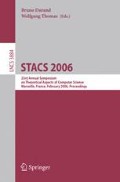Abstract
We show that a set is m-autoreducible if and only if it is m-mitotic. This solves a long standing open question in a surprising way. As a consequence of this unconditional result and recent work by Glaßer et al. [12], complete sets for all of the following complexity classes are m-mitotic: NP, coNP, \(\bigoplus\)P, PSPACE, and NEXP, as well as all levels of PH, MODPH, and the Boolean hierarchy over NP. In the cases of NP, PSPACE, NEXP, and PH, this at once answers several well-studied open questions. These results tell us that complete sets share a redundancy that was not known before. In particular, every NP-complete set A splits into two NP-complete sets A 1 and A 2.
A full version of this paper is available as ECCC Technical Report TR05-068.
Access this chapter
Tax calculation will be finalised at checkout
Purchases are for personal use only
Preview
Unable to display preview. Download preview PDF.
References
Agrawal, M.: Pseudo-random generators and structure of complete degrees. In: 17th Annual IEEE Conference on Computational Complexity, pp. 139–145 (2002)
Ambos-Spies, K.: P-mitotic sets. In: Börger, E., Hasenjäger, G., Roding, D. (eds.) Programming Languages and their Definition. LNCS, vol. 177, pp. 1–23. Springer, Heidelberg (1984)
Balcázar, J., Schöning, U.: Bi-immune sets for complexity classes. Mathematical Systems Theory 18(1), 1–10 (1985)
Beigel, R., Feigenbaum, J.: On being incoherent without being very hard. Computational Complexity 2, 1–17 (1992)
Berman, L., Hartmanis, J.: On isomorphism and density of NP and other complete sets. SIAM Journal on Computing 6, 305–322 (1977)
Buhrman, H., Fortnow, L., van Melkebeek, D., Torenvliet, L.: Separating complexity classes using autoreducibility. SIAM Journal on Computing 29(5), 1497–1520 (2000)
Buhrman, H., Fortnow, L., van Melkebeek, D., Torenvliet, L.: Using autoreducibility to separate complexity classes. SIAM Journal on Computing 29(5), 1497–1520 (2000)
Buhrman, H., Hoene, A., Torenvliet, L.: Splittings, robustness, and structure of complete sets. SIAM Journal on Computing 27, 637–653 (1998)
Buhrman, H., Torenvliet, L.: On the structure of complete sets. In: Proceedings 9th Structure in Complexity Theory, pp. 118–133 (1994)
Buhrman, H., Torenvliet, L.: Separating complexity classes using structural properties. In: Proceedings of the 19th IEEE Conference on Computational Complexity, pp. 130–138 (2004)
Buhrman, H., Torenvliet, L.: A Post’s program for complexity theory. Bulleting of the EATCS 85, 41–51 (2005)
Glaßer, C., Ogihara, M., Pavan, A., Selman, A.L., Zhang, L.: Autoreducibility, mitoticity, and immunity. In: Jedrzejowicz, J., Szepietowski, A. (eds.) MFCS 2005. LNCS, vol. 3618, pp. 387–398. Springer, Heidelberg (2005)
Glaßer, C., Ogihara, M., Pavan, A., Selman, A.L., Zhang, L.: Autoreducibility, mitoticity, and immunity. Technical Report TR05-11, ECCC (2005)
Glaßer, C., Pavan, A., Selman, A.L., Zhang, L.: Redundancy in complete sets. Technical Report 05-068, Electronic Colloquium on Computational Complexity (ECCC) (2005)
Ladner, R.: Mitotic recursively enumerable sets. Journal of Symbolic Logic 38(2), 199–211 (1973)
Mahaney, S.: Sparse complete sets for NP: Solution of a conjecture of Berman and Hartmanis. Journal of Computer and Systems Sciences 25(2), 130–143 (1982)
Ogiwara, M., Watanabe, O.: On polynomial-time bounded truth-table reducibility of NP sets to sparse sets. SIAM Journal of Computing 20(3), 471–483 (1991)
Trakhtenbrot, B.: On autoreducibility. Dokl. Akad. Nauk SSSR 192 (1970); Translation in Soviet Math. Dokl. 11, 814– 817 (1970)
Yao, A.: Coherent functions and program checkers. In: Proceedings of the 22n Annual Symposium on Theory of Computing, pp. 89–94 (1990)
Author information
Authors and Affiliations
Editor information
Editors and Affiliations
Rights and permissions
Copyright information
© 2006 Springer-Verlag Berlin Heidelberg
About this paper
Cite this paper
Glaßer, C., Pavan, A., Selman, A.L., Zhang, L. (2006). Redundancy in Complete Sets. In: Durand, B., Thomas, W. (eds) STACS 2006. STACS 2006. Lecture Notes in Computer Science, vol 3884. Springer, Berlin, Heidelberg. https://doi.org/10.1007/11672142_36
Download citation
DOI: https://doi.org/10.1007/11672142_36
Publisher Name: Springer, Berlin, Heidelberg
Print ISBN: 978-3-540-32301-3
Online ISBN: 978-3-540-32288-7
eBook Packages: Computer ScienceComputer Science (R0)

